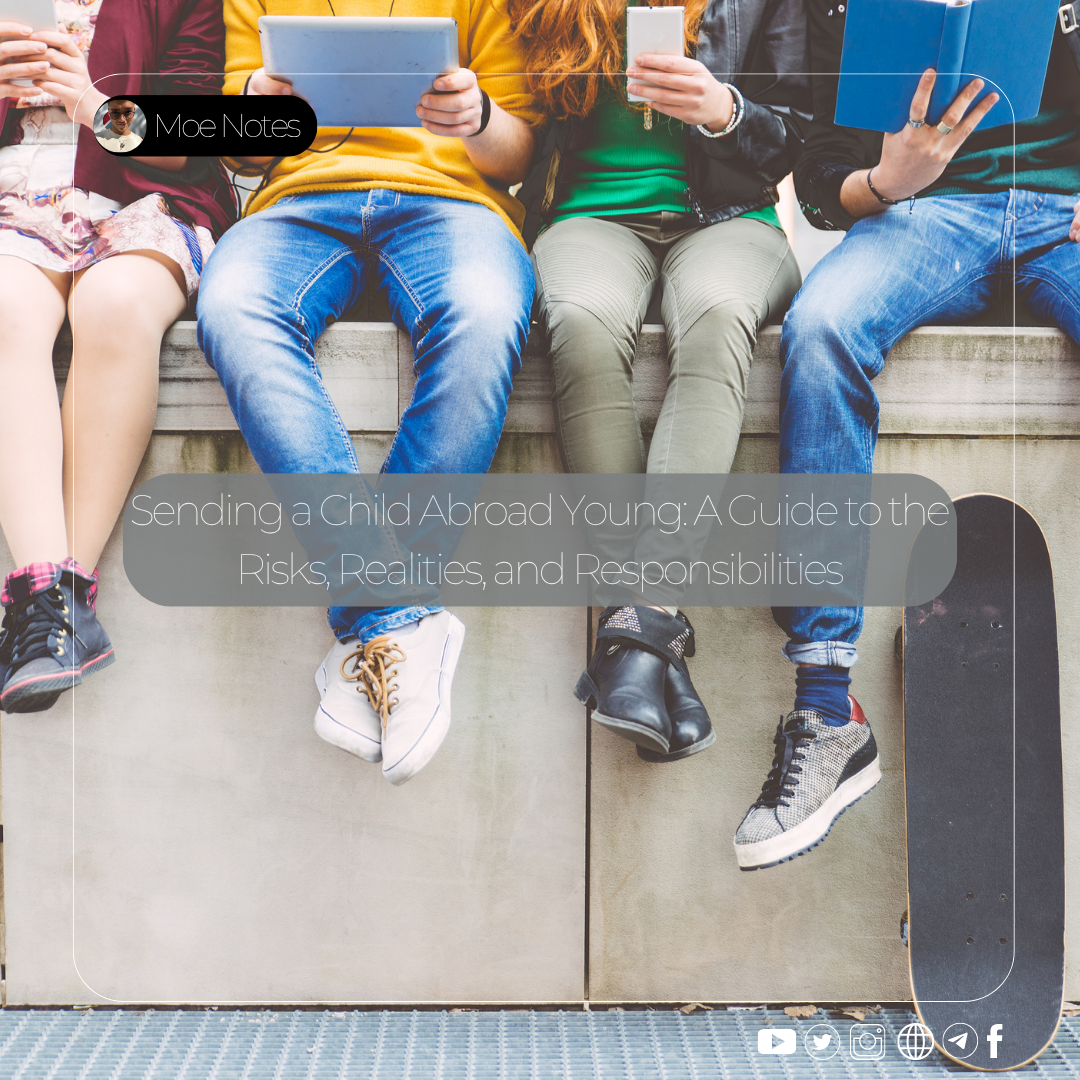Sending a Child Abroad Young: A Guide to the Risks, Realities, and Responsibilities

This article is also available in [Burmese]
In the past, "abroad" was seen through two extreme lenses. One was a place of moral decay and lost culture, a dangerous world for a young person. The other was a perfect, safe paradise where everyone is happy and free. As we have gained more exposure, we have come to see it as a place of opportunity.
But when parents decide to send their child abroad, they are often caught between these two views. The misunderstandings that can arise between parent and child, the harsh realities a young, immature person faces in the real world, and the way foreign countries treat minors—these are all significant hurdles. This can lead to situations of complete ruin. These are the things you must prepare for.
Part 1: The Vulnerable Mind - Understanding the Teenage Years
The "youth" stage of life is a fragile one. It is an age of rebellion, of talking back, of wanting to experiment with everything. If you point them down a good path, they can flourish. If you point them down a bad one, they can be terribly ruined.
This guidance, whether good or bad, can be direct or indirect.
- Direct Influence: A parent who drinks teaches their child to drink. A guardian who teaches that lying is necessary to get ahead.
- Indirect Influence: A parent who drinks but tells their child, "Don't copy me, you're still a child." A family environment filled with constant shouting and fighting.
A child from a chaotic home and a child from a peaceful one will not be the same. Don't be mistaken: from birth until about age five, a child is like a basin with no filter. Whatever you pour in—hot or cold—it all goes in. It is all accepted. The habits they learn from their closest guardians in these early years will shape the adult they become.
Part 2: The Great Exodus - Why Are We Sending Children Abroad So Young?
It is natural that no one wants to live in a deteriorating, stagnant country. After the military announced the conscription law, a flood of people began preparing to leave. This has been intensified by the country's worsening inflation. People are grabbing whatever opportunity they can, while they still can.
As a result, children of all ages are being sent abroad. A student who finished 4th grade is sent to be placed in Secondary 2. A 7th grader jumps straight into an IGCSE O-Level class. I hear from 16-year-olds asking if they can go abroad, and I see 13-year-olds trying to attend high school alone.
So, when we try to send these "good" or "bad" young people abroad, what are the potential outcomes?
Part 3: Two Parental Traps - "The Corrupting West" vs. "The Perfect Paradise"
Parents often fall into one of two flawed ways of thinking about "abroad."
Trap 1: "Abroad is a Terrible, Corrupting Place."
You hear the claims: "Kids at foreign schools are rude." "Girls abroad smoke and drink." "When they come back, they don't respect their parents anymore."
Let's use critical thinking—the 5 Ws and 1 H—to examine this. What does it mean to "not respect your parents"?
- Does it mean they no longer bow their head when they walk past you?
- Does it mean they no longer silently accept everything you say, just to please you?
- Does it mean they no longer agree with you without question?
- Or, does it mean they now explain things to you logically? That they are honest about what they do and don't understand? That they speak to you boldly, without fear or hesitation?
Is that truly a lack of respect? Before you accept a claim, you must question it. Think about the possibility of your own child's situation. Don't just assume what happened to someone else's child will happen to yours. Ask why.
Trap 2: "Abroad is a Perfect Paradise."
This is the opposite error in thinking.
- "Abroad, everyone is free and noble. White people are always virtuous. There is no racism."
- "Abroad, it is 100% safe, 24/7. People leave their doors unlocked. If you lose something, you'll get it back."
- "Once they get abroad, everything will be fine. My job is done."
Again, you must use critical thinking. Which "abroad" are you talking about? In Thailand, there are plenty of people who will try to overcharge you simply because you are a foreigner. Racism? Go to any Southeast Asian country and see how they treat white people versus how they treat fellow Asians. Even in the UK, while many people do leave their doors unlocked because of a robust CCTV network and a justice system that has real consequences, crime still exists. London has a high crime rate in certain areas. You must be aware and street-smart everywhere.
Part 4: The Legal Straitjacket - The Reality of Being a Minor (Under 18) in the UK
In the UK, anyone under the age of 18 is legally a minor, and this comes with significant restrictions that many parents don't anticipate.
- Prohibited Purchases: A minor cannot legally buy tobacco, vape products, alcohol, knives, scissors, or any sharp object. Shops are required to check ID.
- Restricted Access: A minor cannot enter bars, pubs, or clubs.
- Parental Consent: For many things—renting a room, certain medical treatments, research participation—parental consent is required.
- Travel: Airlines have strict rules for "unaccompanied minors," often requiring a named guardian for pick-up and drop-off.
- Banking: A minor can typically only open a child's bank account, which has restrictions on transfers and withdrawals.
In short, if you are under 18 in the UK, you can't do much of anything on your own. How do young people get around this? They ask an older friend to buy things for them. At first, this seems fine. But over time, not wanting to feel like a child, they may be tempted to get a fake ID. This can be the first step down a dangerous path for a young person who has not yet developed strong judgment.
Part 5: The Most Important Skill - Teaching Judgment, Not Just Rules
This is the core issue. A young person's success abroad depends less on their age and more on their ability to think critically and make sound judgments.
An immature person might be told by their parents to "save money." They might interpret this as a license to live on cheap instant noodles while spending their actual budget on alcohol and going to bars. Another student, trying to be independent, might work themselves to exhaustion at a part-time job to avoid asking their parents for money, even when their family can afford to support them. In both cases, their health and their studies suffer. This isn't saving; it's a flawed decision-making process.
A Guide for Guardians: How to Build a Resilient Child
This ability to think and to judge is something that must be taught. Parents, you must avoid the actions that create helpless children.
- Don't confiscate their phone. Teach them how to use it responsibly.
- Don't give them money only when they beg for it like a child. Give them a weekly or monthly budget and teach them how to manage it.
- Don't treat them like they know nothing. Include them in decisions.
And please, be aware of what constitutes child abuse. It is not just physical injury. It can be emotional (constantly belittling them), neglect (ignoring their health needs), or financial (making them beg for every kyat). These actions, even if unintentional, create children who are unprepared for the world.
Conclusion: It's About Maturity, Not Just Age
The worst-case scenario for a young person abroad is that they fall into addiction and drop out of school, unable to continue with their life.
Ultimately, readiness is not strictly about age. A 16-year-old who has been raised to be responsible and thoughtful may be more prepared than a sheltered 20-year-old who has never faced a real-world challenge. The most important thing a parent can do is to be their child's closest friend and first advisor. Maintain that bond, especially across the distance.
These are the difficulties that both parent and child can face when sending a child abroad at a young age. Please be careful. Nothing ever goes exactly as planned.



